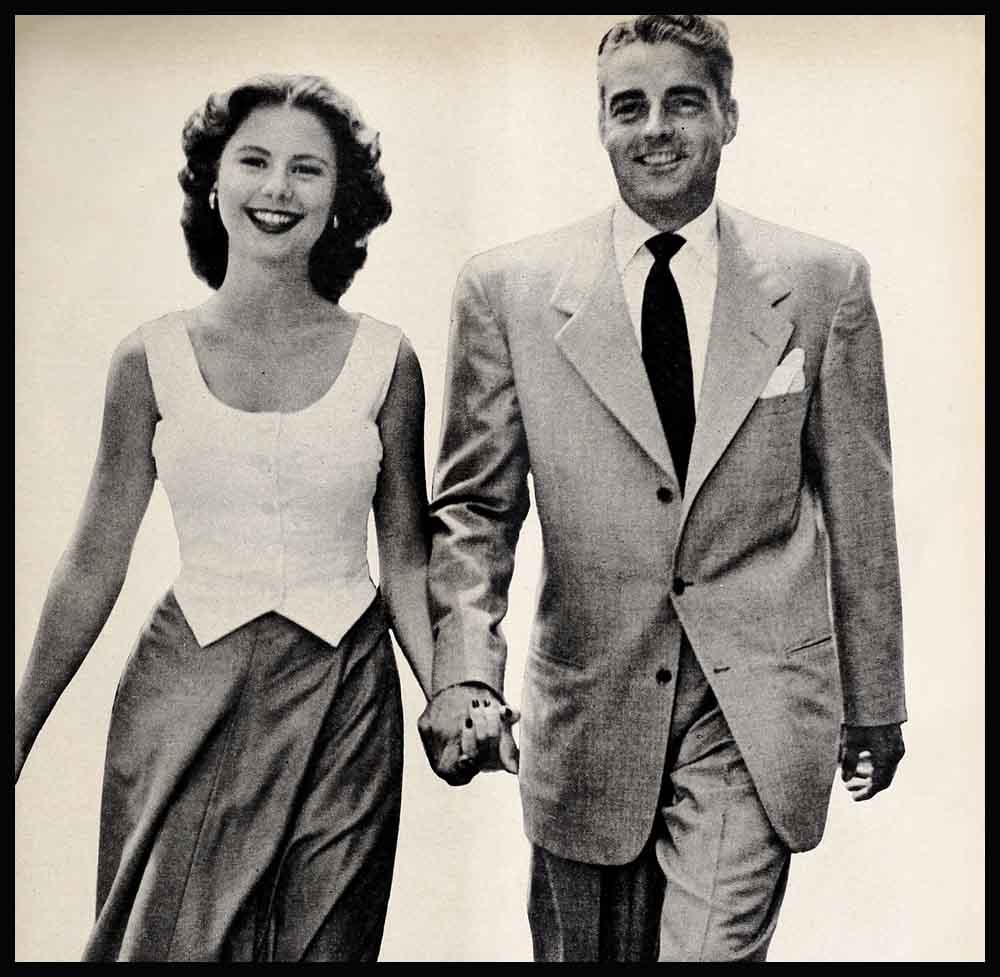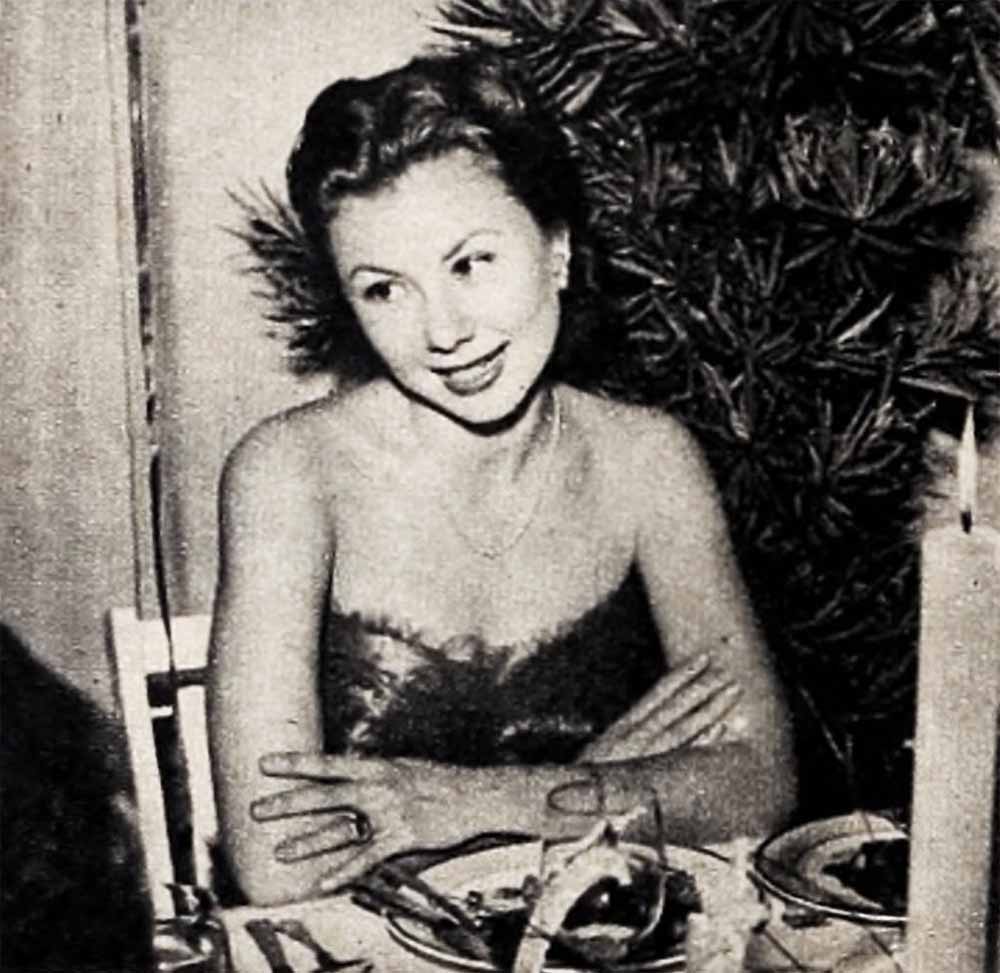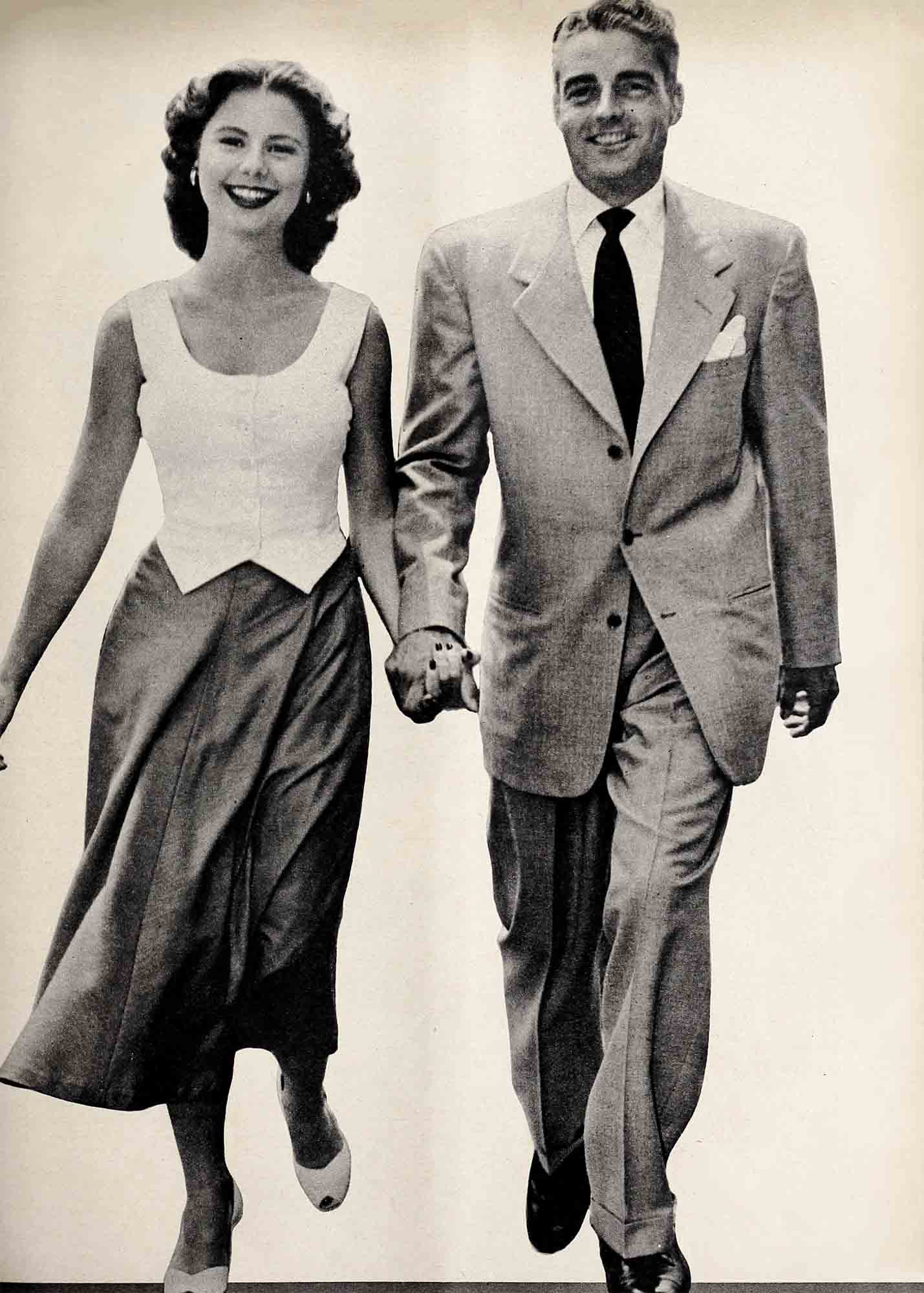
The Strange Romance Of Mitzi Gaynor
As you read this, twinkle-toed Mitzi Gaynor is whirling across the stage of the Philharmonic in downtown Los Angeles in “Jollyanna’“whirling to the exciting rhythm of mounting applause. A dream come true—the lights outside blaze that she is the star. So thrilling are those lights that she can forgive for the moment another dream delayed.
This is the story of that other dream. It is a story which began backstage five years ago when she was playing a bit part, dreaming of being the star—and when she met the man she also dreamed of marrying. Mitzi’s own love story has all the storybook ingredients, all the drama, the conflict to match anything in which this sparkling young actress has ever starred on the screen. Including a “magic” pair of purple slippers!
The romance of warm, vivacious Mitzi, who whirls so eagerly through life on her talented tip-toes, and the handsome thirty-three-year-old attorney, Richard Coyle, has had a dizzying impact on Hollywood. Mitzi’s marriage, when to be or not to be—and whether, in fact, it had not already been—has long been the question. Deny them as she might, rumors kept recurring that Mitzi was already married—and had been for quite some time to her first and only love.
Puzzled at the interest shown, Mitzi once remarked to a friend, “Since I’ve been in motion pictures, I can’t remember a day—not one—when somebody hasn’t come up to me and asked when I’m going to get married. Or said, ‘Congratulations, Mitzi! I hear you’re already married.’ Why? Wouldn’t you think there’d be something else to talk about?”
But love helps substantially in making the movie world go ’round. In an industry which blossoms on boy-meets-girl, gossip columns are ever alert. The young star and the attorney have been a never-changing twosome. Some thought they looked married, acted married. The fact that they celebrated holidays raking leaves and working together in Mitzi’s yard didn’t detract from the idea. But no marriage license could be unearthed. Neither was listed on the other’s income tax return. Columnists found no evidence. . . .
Her romance, as related by Mitzi, is a familiar story. Her attorney-fiance was her first beau. They met when she was appearing in “Naughty Marietta” at the Philharmonic five years ago. They have gone steady ever since. She promised her mother “many years ago—when I was a little girl—long before I met Richard—that I wouldn’t get married until I was twenty-one.” Until then, she was just “engaged to be engaged. . .”
Mitzi turned twenty-one September 4th, a few days before she opened as the star of “Jollyanna.” Reporters were all poised to print how, like Cinderella, on the stroke of midnight come September 3rd she would turn into a blushing bride. But they were denied this when, weeks before that date, Mitzi said her wedding would have to be postponed. “Look,” she said unhappily, “I never said I’d get married the first day after I was twenty-one!”
It became generally known that for an interval Mitzi’s fiance and his mother had occupied a separate four-room apartment in the rambling three-story house high on a hilltop overlooking Hollywood which Mitzi and her mother rent. This added to the rumors that Mitzi was secretly married.
According to friends, this was an economy move. Mitzi, who admittedly likes “the feeling of living on a hill,” and her mother found the place and rented it months before she signed her motion picture contract. With their inherent warmth and hospitality, they wanted a place with a welcome mat large enough for the overflow of relatives and friends who visit them. Rent and expenses were high. As Mitzi once told a friend, “For a while there we were having hamburgers every night. And hamburgers every night can get pretty tiresome.” Four rooms of the house divide into an apartment with its own outside entrance. This they could rent. And they did—to the Coyles, to Richard and his mother, who were looking for an apartment at that time.
During the years, Mitzi’s mother, whom her fiance teasingly calls “Slim,” and his mother, whose name is “Min”—and whom Mitzi addresses affectionately as “My Min”—have become very close friends. Also, this would enable both families to economize towards the home the engaged couple planned to buy.
Her explanation for postponing her marriage is very simple, and very believable. “We can’t get married now,” Mitzi says. “I’ll be with the show on through the middle of January, and I’m not going to get married when I’m doing a show. We’re taking ‘Jollyanna’ across the country—maybe to Broadway. This wouldn’t be my idea of marriage—Richard traveling around and catching up with us for a day or two whenever he could. We want ours to be a normal marriage. That’s the way Richard and I are. We couldn’t be more normal. None of that tinsel and quick-silver part of this business for us. We have been to a night club but three times in as many years—each time it was to celebrate my mother’s birthday. I love Hollywood and my career, but with us it’s business. One we both like and respect, but still a business. We don’t want a ‘theatrical’ marriage. We’d rather wait and have our wedding the way we’ve planned it for so long.”

A hectic hurried ceremony between the matinee and the evening show is not for Mitzi. Nor a backstage honeymoon. After five years you can wait a few months more.
Today, Mitzi’s name is in lights and she has the star’s dressing room she once visualized, but marriage as she planned it must wait. Not even the help of her own magic slippers, her beloved purple toe shoes which superstitious Mitzi calls her “lucky shoes”—because she was wearing them in a show when Twentieth Century-Fox discovered her—could arrange this. “Nobody else believes they help—but if I believe they’re lucky, then it means that to me,” says Mitzi, who always wears them the first day of every picture.
Her contract specifies she be given six months off after three years to do a stage show, and that it must be done with Producer Edwin Lester, who gave her her big break. In this, the third year, Mitzi was offered the lead in “Jollyanna.”
“Just think, the star of the show!” Mitzi says, even now still wide-eyed about it. “It’s so wonderful to be the star. The way they ask your opinion of numbers and costumes and everything. The way everybody keeps saying ‘What do you think, Mitzi? What would you like, Mitzi?’ . . . Golly!”
Not so wonderful, however, is the thought of long weeks she may be separated from her fiance while the show is on the road. Not when she remembers a week away from him last year, when she vacationed with her mother and aunt in Twenty-Nine Palms. “The first two days were fun—but by the third, I was calling him long distance three times a day!”
But wisely enough, her fiance understands their respective roles in the backstage drama that is a familiar part of stardom and its demands. As for Mitzi—just inquire whether during the past five years she wouldn’t have been wise to encourage other admirers, as some basis for comparison, and you get an amazed, “Why should I have gone with anybody else? He’s everything I could ever want in a man. When you find somebody like Richard—” she breaks off. Then picking up steam, “Look, when you’re ahead. . .”
When you’re ahead, don’t press your luck. Don’t try the purple shoes too far.
How lucky for her the past five years have proven. Along with the fact that a teenager named Mitzi Gaynor knew her own head and heart amazingly well.
From the first, she felt it would be right for her to marry someone outside her own profession. A lawyer, say. “Professional men are less emotional,” she points out. “Take me—I’m either way up or so far down you can’t dig me up with a spade. But Richard is a very calming influence.”
Let her blow up about something with, “Oh, you make me so mad!” “And where can you go from there,” says Mitzi, “when the man in question just agrees calmly, ‘I know I do, dear. But let’s just think this thing out.’ ” By the time she sits and thinks a few seconds, the whole matter is straightened out.
“These lawyers—they’re so logical!” says Mitzi. “But so right for me. I keep expecting Richard to rave and rant back at me. But he never does. He just looks at me and listens to my argument, then he calms me down.”
A close association of five years like theirs enables both to make compromises and adjustments. “The first year we disagreed on a lot of things. Or rather, I did. But I was so in love—I didn’t know from nothin’ anyway. We understand one another very well now. Richard is so understanding, and so right for me in every way. He has none of the little traits or mannerisms that irritate me. It’s the little things in a marriage that can be so annoying—I would imagine.”

After five years, a girl observes her share of little things too, like looking at a man’s face and knowing instinctively how weary he is.
After five years, she can know how wonderful his sense of humor is and appreciate his teasing way. Like when Mitzi drops some slang expression she has picked up at the studio. “You know, phrases like ‘he’s real gone,’ or get enthusiastic about a choreographer and tell Richard, ‘This man is the coolest thing that ever happened to anybody!’ ” Upon which her attorney-fiance elevates his own cool eyebrow. “Cool?” he repeats. “You know, honey—cool,” says Mitzi. Then, as per long-established ritual, she laughs, “He says, ‘Well—let’s get the book.’ He looks it up in the dictionary and says—‘Oh— rigid—eh?’ ”
In five years she can know there’s nothing to fear from their two careers. “He knows I’ve been working in some phase of show business for seven years now, that I’ve grown up with it and enjoy it. If he thought it was just the money, he might be different. But he knows how much it means to me. He’s a tremendous help too, reading lines with me. I get two copies of every script. He has his and I have mine. He’s taught me so much about how to ‘think’ a line through, as well as the shortcuts to learning them.”
And going steady for five years allows ample time to study at close range one’s prospective mother-in-law.
“My mother thinks more of Richard than she does of me,” States Mitzi. She adds laughingly, “And I don’t like it one bit. I keep reminding him, I’ve lost a mother and you’ve got another one.’ Mine is always going around asking Richard, ‘What can I fix you, dear? What can I do for you, dear?’ She treats him like a king. As for Richard’s mother—My Min —I adore her! We look more alike than my mother and I do. And My Min is always taking up for me.”
When their two families dine together at Mitzi’s, her fiance is always threatening, teasingly, “I’ll go home to your mother.” Adding with a sigh of sheer satisfaction, “You can marry me if you want to—but bring your mother along. I don’t trust you in the kitchen.” Whereupon his bride-to-be reminds, “But your mother is teaching me how to cook!”
Regardless of their shared opinion that newlyweds should live alone, already they can weigh the potential disadvantages. “We keep asking ourselves, ‘How can we do without them?’ ” laughs Mitzi. “What with Richard being so very fond of my mother’s cooking. And where could I find another canasta partner like My Min?”
They’re an affectionate family foursome, whether they’re playing cards or spending a gala evening together at a neighborhood movie, armed to the teeth with popcorn. If it’s Mitzi’s picture, they sit in a tense family huddle. If her mother, out of their long working partnership, offers any helpful comments, “Why didn’t you . . .” Min will be sure to counteract with, “I think you were just fine, Mitzi.” Richard? “He just sits there saying nothing, with his hands clenched, waiting for the jury to come in.”
At the moment Mitzi and her husband-to-be are looking for a home to buy. “Preferably a house on a hill. I’d love living up above the Sunset Strip.”
As this is written her plans are to be married “early next year when I finish in ‘Jollyanna.’ We want a simple church wedding with a few close people,” she says seriously, then breaks off, laughingly remembering how many close relatives and close friends they both have. “Maybe we’ll hold it on television.”
Her wedding gown? “I don’t like to talk about that,” she says, serious again. “I’m so superstitious. A magazine wanted me to model a wedding gown layout—but I wouldn’t dare. It’s the same when I’m up for a part. I never talk about it. Sometimes I don’t even tell Richard. I’m bursting, but I don’t say anything until I know—for fear of jinxing it.”
Which brings up the matter of the “lucky” house Mitzi and her mother now rent, concerning which Mitzi has observed with some degree of mild understatement, “It’s a busy house.”
“It’s no great shots of a house,” she says, “but it’s such a lucky house! Since we’ve been living there, I landed the part in ‘The Great Waltz,’ I signed with Twentieth, I got the part in ‘Golden Girl,’ and ‘I Don’t Care Girl’ and ‘Bloodhounds of Broadway’ and now ‘Jollyanna.’ My mother has written a television play, and a recording company is interested in putting out an album of songs with her lyrics. My cousin Yvonne Ruby quit her job with an ice show and started working with a modeling agency, and she hasn’t been two days without a job since then. Her boy friend, Coulter Irwin, hadn’t worked in a year, but he came over to the house three times to see her—and got a series of television shows! It’s such a lucky house, I don’t see how I can leave it.”
In the meantime, take Mitzi’s word for it. “We’re not married—and we’re not going to get married right now.” She refuses to be rumored into a wedding other than that which fulfills her own five-year-dream.
Then, and only then, can Mitzi Gaynor put her purple shoes away.
THE END
It is a quote. PHOTOPLAY MAGAZINE OCTOBER 1952




